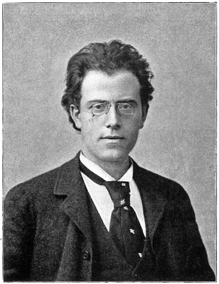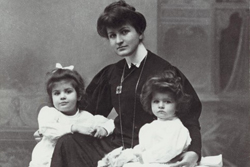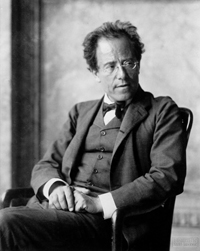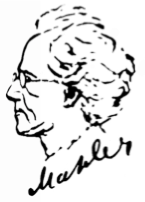 Gustav Mahler was born on July 7, 1860 to a middle-class Jewish family in Kaliste, Bohemia, then part of the Austro-Hungarian Empire. He received his principal musical training at the Vienna Conservatory, beginning in 1875. Mahler’s drive to compose began in his early years, but he found he could make a good living by conducting, which in turn allowed him time to compose. Posts at several opera houses, including Prague, Leipzig, Budapest, Hamburg, eventually led to the directorship of the Vienna State Opera in 1897.
Gustav Mahler was born on July 7, 1860 to a middle-class Jewish family in Kaliste, Bohemia, then part of the Austro-Hungarian Empire. He received his principal musical training at the Vienna Conservatory, beginning in 1875. Mahler’s drive to compose began in his early years, but he found he could make a good living by conducting, which in turn allowed him time to compose. Posts at several opera houses, including Prague, Leipzig, Budapest, Hamburg, eventually led to the directorship of the Vienna State Opera in 1897.
As a Jew, Mahler was exposed to anti-Semitism all his life, including an official “Anti-Semitic” press in Vienna. Some music commentators treated Mahler favorably, while others were vitriolically opposed.
To obtain the Vienna State Opera directorship, it was necessary to be a Catholic, so Mahler converted. During his ten years directing the Vienna Opera, he expanded repertoire and raised artistic standards, and his exacting perfectionism earned him both respect and enmity. His summers were spent composing in idyllic mountain settings.
 In 1902, he married Alma Schindler (1879-1964), a musician and composer twenty years his junior. They had two daughters, Maria Anna, (1902-1907), and Anna (1904-1988), nicknamed respectively “Putzi” and “Gucki”. Maria’s death in 1907, at age four, was a huge blow, followed that same year by Mahler being diagnosed with a faulty mitral heart valve, a condition that could, in those pre-antibiotic days, lead to a heart infection. As 1907 continued, Mahler, weary of the administrative burdens of the Vienna Opera, accepted an attractive offer from the Metropolitan Opera in New York that included a larger salary, no administrative duties, and far more time for composing.
In 1902, he married Alma Schindler (1879-1964), a musician and composer twenty years his junior. They had two daughters, Maria Anna, (1902-1907), and Anna (1904-1988), nicknamed respectively “Putzi” and “Gucki”. Maria’s death in 1907, at age four, was a huge blow, followed that same year by Mahler being diagnosed with a faulty mitral heart valve, a condition that could, in those pre-antibiotic days, lead to a heart infection. As 1907 continued, Mahler, weary of the administrative burdens of the Vienna Opera, accepted an attractive offer from the Metropolitan Opera in New York that included a larger salary, no administrative duties, and far more time for composing.
The next few years would see him conducting the New York Philharmonic, the premiere of his Symphony No. 8 in Munich, Alma’s infidelity and its toll on their marriage, and the continuing deterioration of his health. He died in Vienna on May 18, 1911, at the age of fifty, from an infection of his faulty heart valve.

Mahler completed nine symphonies, some of which included vocal soloists and choruses, leaving a tenth unfinished, in addition to settings of a series of Chinese poems translated into German, Das Lied von der Erde (“The Song of the Earth”).
Mahler also wrote some forty songs, including two song cycles, Lieder eines fahrenden Gesellen (“Songs of a Wayfarer”), and Kindertotenlieder (“Songs on the Death of Children”), and two sets entitled Des Knaben Wunderhorn (“The Youth’s Magic Horn”), and Lieder nach Ruckert (“Songs after [the poet] Ruckert.”)
Best known in his lifetime as a leading orchestral and operatic conductor, Gustav Mahler’s compositions were never fully understood or accepted by the musical establishment in Vienna. Mahler himself realized this, and said, “My time will yet come.” Now acknowledged as one of the most important late-romantic composers, his works continue to be recorded, his music continues to draw audiences, and musicologists still study and edit his scores– his time is now, and will continue into the future. — Jill Maret Ferguson

